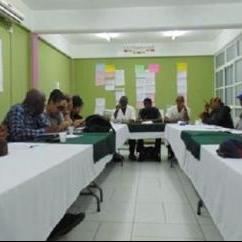
Port of Spain. January 24, 2014 - Over 20 fisherfolk leaders from the National Association of Fisherfolk Cooperatives (NAFCOOP) and its affiliate cooperatives participated in a National Fisherfolk Workshop, in Dominica, from January 20 to 21. This workshop was aimed at strengthening the capacities of the fisherfolk organisations in Dominica to become better engaged in the national, regional and international processes for developing and implementing fisheries policies. It was co-facilitated by Mr. St. Bernard Sebastien, mentor to NAFCOOP, and Ms. Keisha Sandy, Technical Officer, CANARI.
“The voice of the fishers is not heard. This project can give us [a] better voice.” Huron Vidal, President of NAFCOOP, in his introductory speech during a panel discussion on Tuesday, January 21, 2014.
During the workshop, the fisherfolk leaders, using an organisational needs assessment approach, identified challenges to fisherfolk organisations in Dominica playing an effective role in fisheries governance and management, then identified opportunities to address some of the main challenges by getting involved in key national, regional and global policy and decision-making processes.
One of the key challenges identified was inadequate financial management in the fisherfolk organisations, particularly those at the primary level. This was one of the factors affecting the ability of cooperatives to attract members, especially for fishers who have had bad experiences with such entities in the past. The participants advocated for the creation and implementation of financial management plans for all fisherfolk organisations in Dominica. The fishers also recognised the importance of conducting thorough assessments of their respective organisations to determine their capacity needs.
Supporting the engagement of fisherfolk is especially critical now as there are a number of international, regional and national policies being developed and implemented that will impact on the livelihoods of fisherfolk. The Caribbean Network of Fisherfolk Organistions (CNFO) in consultation with its membership, including NAFCOOP, is putting forward fisherfolk positions in ongoing negotiations on the International Guidelines on Securing Sustainable Small Scale Fisheries, which are being coordinated by the United Nations Food and Agricultural Organisation (FAO). At the regional level, they are seeking to input into the implementation of the Caribbean Community Common Fisheries Policy.
The workshop was convened under the over 1 million Euro European Union funded project Enhancing food security from the fisheries sector in the Caribbean: Building the capacity of regional and national fisherfolk organisation networks to participate in fisheries governance and management, which is targeting fisherfolk organisations in the countries of Anguilla, Antigua and Barbuda, the Bahamas, Belize, Barbados, Dominica, Grenada, Guyana, Haiti, Jamaica, Montserrat, Saint Lucia, St Kitts and Nevis, St Vincent and the Grenadines, Suriname, Trinidad and Tobago and Turks and Caicos. It is being implemented by the Caribbean Natural Resources Institute (CANARI), working in partnership with the Centre for Resource Management and Environmental Studies of the University of the West Indies (UWI CERMES), Caribbean Network of Fisherfolk Associations (CNFO), Panos Caribbean and the Caribbean Regional Fisheries Mechanism (CFRM).
This project is funded by the European Union
- Login to post comments


Recent comments
9 years 12 weeks ago
9 years 32 weeks ago
9 years 36 weeks ago
9 years 40 weeks ago
9 years 41 weeks ago
12 years 7 weeks ago
12 years 21 weeks ago
12 years 41 weeks ago